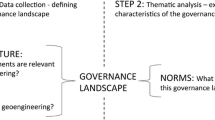Abstract
Stephen Gardiner argues that geoengineering does not meet the “canonical technical definition” of a global public good, and that it is misleading to frame geoengineering as a public good. A public good is something that is nonrival and nonexcludable. Contrary to Gardiner’s claims, geoengineering meets both of these criteria. Framing geoengineering as a public good is useful because it allows commentators to draw on the existing economic, philosophical, and social scientific literature on the governance of public goods.
Similar content being viewed by others
References
Barrett S (2007) Why cooperate? The incentive to supply global public goods. Oxford University Press, Oxford
Barret S (2008) The incredible economics of geoengineering. Environ Resource Econ 39:45–54. doi:10.1007/s10640-007-9174-8
Bodansky D (2012) What’s in a concept? Global public goods, international law, and legitimacy. Eur J Int Law 23:651–668. doi:10.1093/ejil/chs035
Dasgupta P (1982) The control of resources. Harvard University Press, Cambridge, MA
Gardiner SM (2013) Why geoengineering is not a ‘global public good’, and why it is ethically misleading to frame it as one. Clim Chang. doi:10.1007/s10584-013-0764-x
Kreps DM (1990) A course in microeconomic theory. Princeton University Press, Princeton, NJ
Mankiw NG (2004) Principles of microeconomics, 3rd edn. Thomson South-Western
Mas-Colell A, Whinston MD, Green JR (1995) Microeconomic theory. Oxford, New York
Rayner S, Redgwell C, Savulescu J, Pidgeon N, Kruger T (2013) The Oxford principles. Clim Chang. doi:10.1007/s10584-012-0675-2
Ricke KL, Moreno-Cruz JB, Caldeira K (2013) Strategic incentives for climate geoengineering coalitions to exclude broad participation. Environ Res Lett 8:01 4021 (8 pp). doi:10.1088/1748-9326/8/1/014021
Shepherd J et al (2009) Geoengineering the climate: science, governance and uncertainty. Royal Society, London
Samuelson PA (1954) The pure theory of public expenditure. Rev Econ Stat 36:387–389
Samuelson PA, Nordhaus WD (1998) Economics, 16th edn. McGraw-Hill, New York
Svoboda T, Keller K, Goes M, Tuana N (2011) Sulfate aerosol geoengineering: the question of justice. Public Aff Q 25:157–180
Varian H (2006) Intermediate microeconomics: a modern approach, 7th edn. Norton, New York
Acknowledgements
Thanks to Scott Barrett and Daniel Morrow for helpful comments.
Author information
Authors and Affiliations
Corresponding author
Additional information
This comment refers to the article available at doi:10.1007/s10584-013-0764-x.
Rights and permissions
About this article
Cite this article
Morrow, D.R. Why geoengineering is a public good, even if it is bad. Climatic Change 123, 95–100 (2014). https://doi.org/10.1007/s10584-013-0967-1
Received:
Accepted:
Published:
Issue Date:
DOI: https://doi.org/10.1007/s10584-013-0967-1




